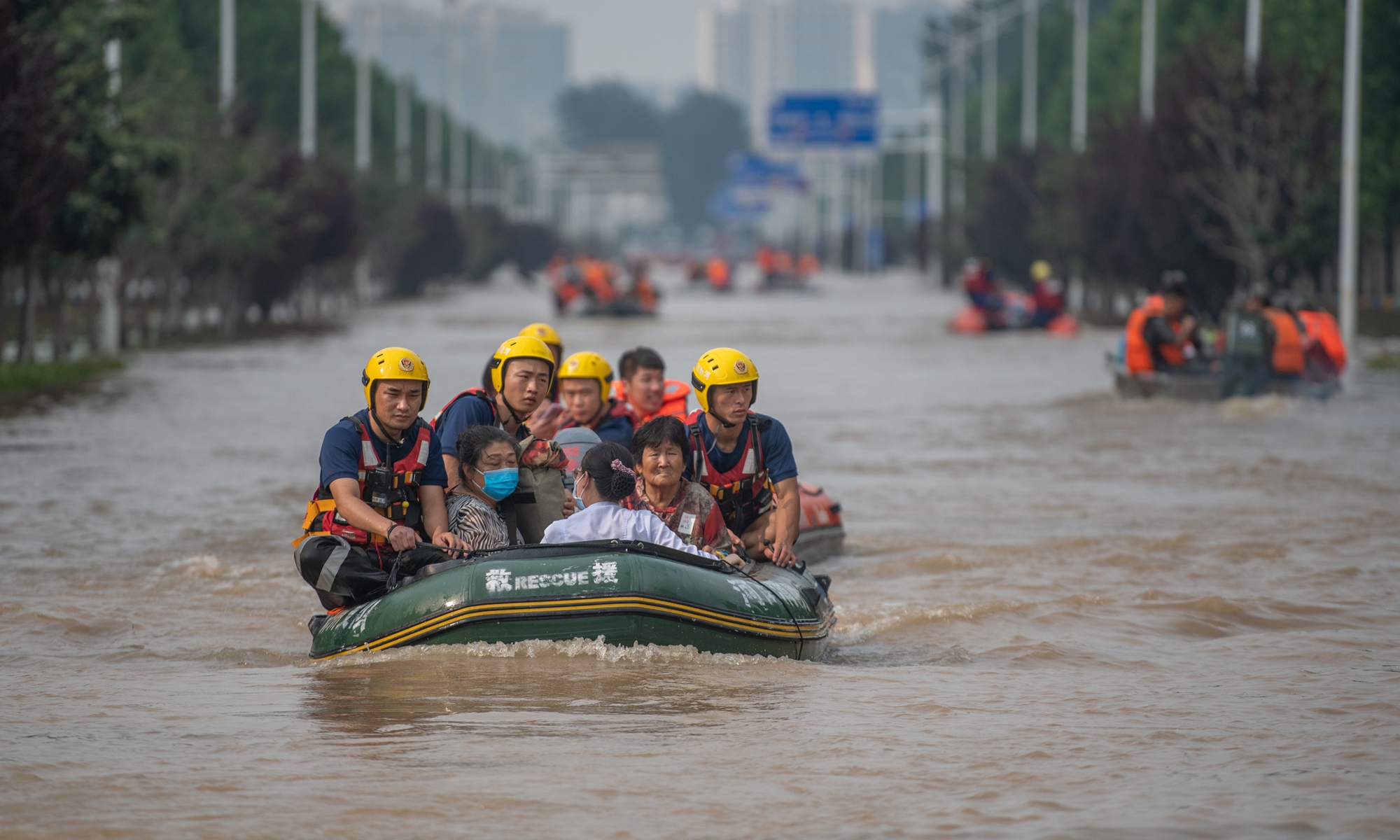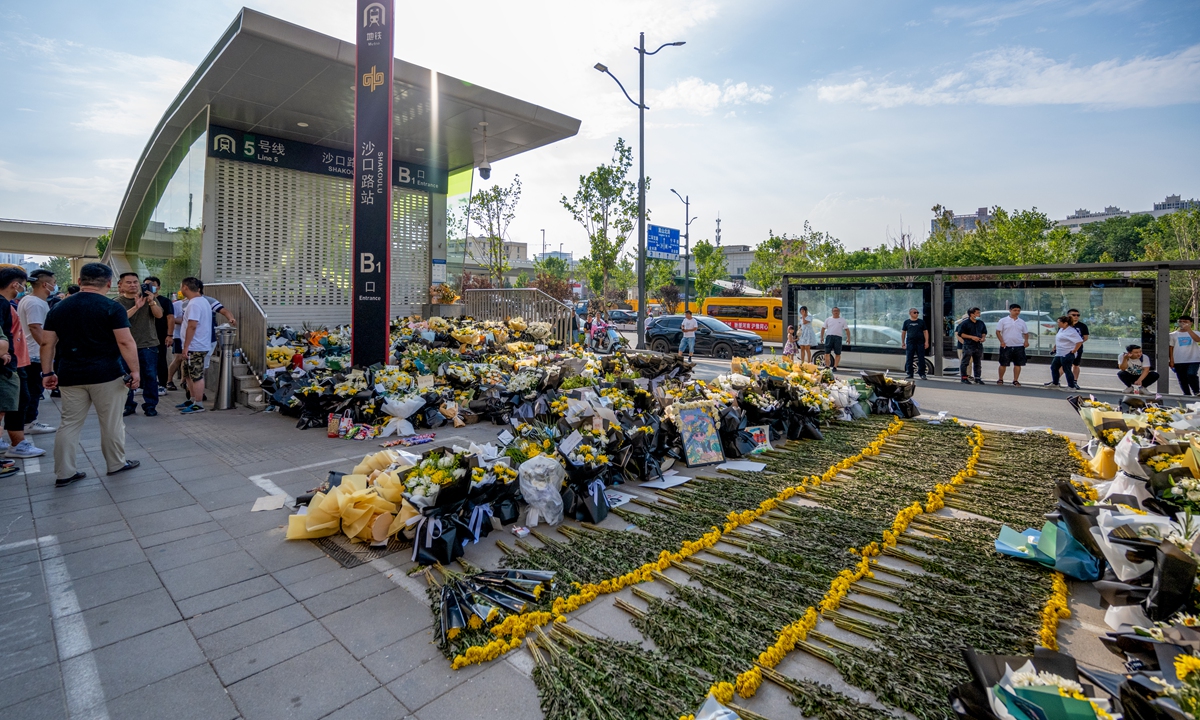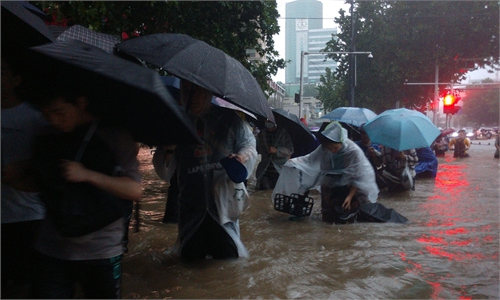Investigation report aimed at correcting mistakes behind Henan flood, praised for people-centered approach of CPC

Photo:VCG
After a half-year investigation, a team entrust by China's central authorities released a full report on the enquiry into the deadly downpours and flooding in Henan Province that left nearly 400 people dead of missing.
The thorough investigation and 46-page report, overseen by the Central Committee of the Communist Party of China (CPC) and the State Council, dug deep into both the natural and human factors behind the disaster and casualties, and also made specific and forceful requirements for correcting the local government's malpractice and officials' dereliction of duty that had worsened the losses.
The unprecedented report, full of details, won unanimous applause from netizens for the depth and transparency of the investigation, with some saying they were moved into tears for the candid and responsible attitude and respect for human lives shown in the report toward reflecting on the tragedy.
The investigation team is comprised of professional personnel from multiple State Council agencies including the Ministry of Emergency Management, Ministry of Water Resources, Ministry of Housing and Urban Development, Ministry of Public Security, Ministry of Health, among others. The team also published a long list of questions and answers to elaborate on the investigation report.
It's the first time that the country has organized such large-scale and comprehensive investigation over a natural disaster in order to clear up loopholes in emergency management. It showcased China has put people's interests first - nothing is more precious than people's lives - and is also a warning to local governments to pay more attention in potential risks and enhance emergency managements to avoid similar disasters, analysts said.
The investigation laid the basis for pursuing accountability of officials. Along with the report on Friday was news on Zhengzhou Party chief Xu Liyi's demotion and punishment on 97 people who failed their responsibilities in the flooding.
From July 17 to 23, 2021, Central China's Henan Province was hit by rare heavy rains and severe floods. Its capital city Zhengzhou suffered heavy casualties and property damage. A total of 14.78 million people in 150 counties and districts in the province were affected, and 398 people were dead or missing, with 380 in Zhengzhou alone.
President Xi Jinping, general secretary of the CPC Central Committee, on multiple occasions has instructed authorities at all levels to give top priority to people's safety and property. The officials were also ordered to carefully and strictly implement the flood prevention and disaster relief measures.
Approved by the CPC Central Committee, the State Council in August established an investigation team to assess the local response to the devastating flood.
According to the report released Friday, the disaster started with extreme rains which led to severe urban waterlogging, floods, landslides and other disasters.
Some local officials in Zhengzhou failed to pay enough attention to the risk at hand and came short on implementing the city's emergency system. Local officials and residents, the report continues, seriously lacked knowledge on how to avert the disaster.
Their lax response caused casualties in the Zhengzhou subway and a road tunnel, which should have been avoided, according to the report.
Authorities have written previous reports on major events that jeopardized safety. But the report on the deadly downpour in Henan is the first time that China has conducted a national-level and comprehensive investigation into a natural disaster, Wang Hongwei, a professor from the Renmin University of China's school of public administration and policy, told the Global Times.
The complexity of the disasters in Zhengzhou lays bare the importance of havinga clear picture - multiple nature disasters, including urban waterlogging, flooding and geological hazards combined with human error. The loopholes in dealing with extreme disasters in Zhengzhou may also be found in other cities, and with climate change and a possible increase in extreme disasters, it is urgent for local governments to learn such lessons and keep alert, Wang said.
The report also details how a delayed alerting system made the city miss the crucial period of organizing emergency responses as the heavy rainstorm raged. For example, the emergency management bureau in Zhengzhou had not started the I-level - a serious level of emergency response - even after four red alerts from meteorological department. As the officials hesitated whether to announce an emergency, tragedy had already happened.
According to the report, departments at different levels in Henan were found reporting false numbers of missing people in different phases and blocking the reporting process. From July 25 to 29, 2021, Zhengzhou and affiliated counties concealed and unreported 116 missing people. The investigation team found that 41 people were unreported in Zhengzhou.

People present flowers at the entrance to Shakoulu subway station on Line 5 in Zhengzhou, Central China's Henan Province on Tuesday to commemorate the victims who died when a subway train was flooded after heavy downpours hit the city on July 20. Photo: VCG
The report also reviewed the incidents that were widely discussed in the public, especially the great casualties in the Zhengzhou subways, tunnels, the dam in Guojiaju being overtopped and the mountain torrents in a village in Xingyang.
During the heavy downpours on July 20, 2021, flood water inundated Line 5 of the Zhengzhou Metro, one of the busiest lines in the city, forcing the train to stop between Shakou Road Station and Haitansi Station. More than 500 passengers were trapped in the waters for nearly four hours. The Jingguang Tunnel was also flooded, with many vehicles trapped. The local officials' lack of swift response exacerbated a disaster that otherwise could have been avoided, the report said.
Wang noted that the report is the basis to hold officials accountable for their malpractices and it can also be seen as a warning to local officials to fully implement policies and change their working concepts and enhance capability in avoiding risks and dealing with emergencies.
Xu Liyi, a member of the Standing Committee of the Communist Party of China's Henan Provincial Committee and Zhengzhou's Party chief, was demoted and given disciplinary punishment. This came after the investigation found that he failed his duties during the disaster.
Police detained eight people for suspected criminal responsibilities in the disaster and will pursue charges against them. In addition, 89 people holding public posts were punished with Party discipline and administrative penalties.
The report pointed out that the major lesson from the disaster is that some leaders, especially those who shoulder chief responsibilities, lacked risk awareness and bottom-line thinking.
In reflecting on the lessons learned from the Henen foods, the investigation report quoted President Xi Jinping's previous speech on improving awareness to potential risks during his seminars with officials on provincial and higher levels in the Party School of the CPC Central Committee. "We would rather hear people complain over preventive measures than hear them cry during disasters," Xi said, demanding the officials to fully implement measures that put people's lives first.
President Xi had also emphasized for many times that a city - from planning, building, to governance - should put priority on safety.
The report noted that Zhengzhou did not have enough prevention measures and had many problems, which ensued during the fast development of the city. For example, compared with other cities with the same scale, Zhengzhou had 2,400 kilometers of storm sewer pipelines, only half of other cities. The facilities to drain waterlogging in subways, tunnels and other places in the city were also lacking.
All these problems reflected the deflection on the concept of political achievements and on overly implementing development ideals, which failed to manage development and security, according to the report. Experts said this could be the start for many cities to enhance safety and risk management, after so many years of fast development.
The report urged greatly improving the officials' awareness to risks and capability in dealing with emergencies, setting mechanisms with leaders of the Party committees and governments taking full responsibilities, having reforms on management systems on emergency, promoting alerting and response systems, enhancing cities' capability in preventing and decreasing disasters, and strengthening the whole society's awareness to risks and capability in self-rescue.
The investigation was done because the disaster was massive. It exposed many problems that the Party, the people and history should know. It offers lessons in fixing loopholes in dealing with emergencies, the Xinhua News Agency cited a person responsible for the investigation team.
Ordering the report shows the people-centered philosophy of the CPC Central Committee. It values the safety of people and their property. The report will also help modernize the management and governance of the country and enhance capability in dealing with disasters, said the person responsible for the investigation team.



